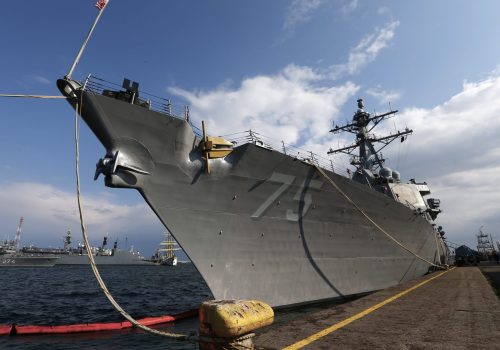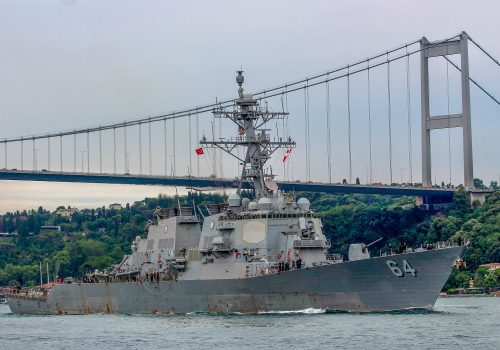To fend off Russia in the Black Sea, the US and NATO need to help boost Allies’ naval power
The Black Sea is the only body of international waters that the US Navy is unable to access at will under international maritime law. As a result, the United States depends on its Black Sea allies and partners to defend their and the United States’ interests. Unfortunately, these states do not currently have sufficient capabilities to defend these interests beyond their coastlines and under the sea.
The urgency of addressing this insufficiency is underscored by growing economic and energy-related activity in the sea and by Russia’s obliteration of the sea’s relative tranquility in recent years. The absence of a credible and sustained allied naval presence across the Black Sea opens the door for Russia to disrupt commercial shipping in international waters, potentially establishing a blockade, which, among other consequences, threatens to undermine Turkey’s treaty-based role as guarantor of the right of navigation in the Black Sea.
Why the Black Sea is different
The 1936 Montreux Convention sets out the access limitations applicable to all non-Black Sea states. Unlike other straits used for international navigation that are governed by the principle of transit passage, the Montreux Convention limits the scale of naval power that non-Black Sea nations can introduce to the Black Sea from the Mediterranean Sea via the Turkish Straits. It proscribes the transit of submarines and capital ships and limits the naval presence of such states to thirty thousand aggregate tons. It also limits the duration of any presence to twenty-one or fewer days.
For the United States, the thirty thousand-ton limit allows for just three Arleigh Burke-class destroyers, or a single San Antonio-class amphibious transport ship, hindering the United States’ ability to sustain a credible defense to NATO and global interests in the Black Sea. Therefore, the United States must help its Black Sea allies and partners build a credible defense. This should begin with US allies and partners expanding their naval capabilities with US help, but it also should include these Black Sea countries expanding their willingness to exercise, train, and operate together, including without the US Navy. This will require focusing on developing interoperable naval capabilities—again, with US help—and can include, for example, setting up a Black Sea construct for the coproduction of ships and submarines.
The goal of all these efforts should be to establish a credible defense of infrastructure and commerce and to preserve freedom of international waters and access to the global commons.
Turkey’s role in shaping a more secure Black Sea
Turkey, in its role as guarantor of the right of navigation in the Black Sea and as the NATO Black Sea ally with the largest navy, is critical to re-establishing order and sustaining deterrence in the Black Sea.
A first step Turkey could take is to lead naval operations in international waters in the Black Sea, further out from its coastline, with its flagship, TCG Anadolu. This would be an excellent way to usher in a new era of allied Black Sea naval deterrence, and it does not require a NATO mandate. While the Black Sea is not large enough to contain high seas, the waters of an exclusive economic zone (EEZ) are international waters and ships of foreign states enjoy freedom of navigation and overflight, enabling Turkey and all Black Sea nations to sail beyond their EEZs, to conduct flight operations and live-fire exercises. These operations could be a springboard for Turkey to expand naval cooperation with Romania and Bulgaria beyond harbor protection and counter-mine operations. Bilaterally and multilaterally, these allies can demonstrate resolve, develop shared maritime awareness, and build interoperability.
The Turkish navy has a lot of capability, including a growing submarine fleet. But its operations so far have done little to alter Russia’s decision calculus, to shape deterrence, or to defend offshore interests and the right of navigation in the Black Sea. As diplomatic efforts fail to ensure the free flow of commerce, NATO, the broader West, and countries reliant on Ukrainian exports to feed their populations are looking to Turkey to implement new pathways to reestablish the right to navigate in the Black Sea. It is time for Ankara’s navy to become a dominant part of that strategy.
What the United States should do
The United States will need to find pathways bilaterally and with other NATO allies to deliver submarine, mine-clearing, and helicopter and drone-capable surface combatants to its Black Sea allies and partners. It must also work cooperatively with NATO and the European Union (EU) to deliver solutions for capability gaps in maritime domain awareness and surface, undersea, and airborne maritime patrol.
In particular, the United States should increase its efforts to deliver interoperable capabilities to NATO allies Romania, Bulgaria, and Turkey, as well as to NATO Partnership for Peace nations Georgia and Ukraine. These countries need the capabilities to defend their territorial waters but also to expand offshore resources and infrastructure in their EEZs and beyond. To help Black Sea allies get these capabilities, the United States can, for example, offer them recently decommissioned littoral combat ships as excess defense articles. It can also initiate foreign military sales for new-construction Constellation-class frigates.
Additionally, Sea Breeze, the US-led multinational naval exercise series in the region, should expand in scope to demonstrate large-area sea control and maritime defense through multiple surface task forces and minimal US Navy ship presence.
What the EU can do for the Black Sea
Current EU member states Romania and Bulgaria border the Black Sea, as do several EU candidate countries. Therefore, the EU has a strong interest in seeing order re-established on the Black Sea. It also has an important role to play in making it happen.
The EU should, for example, procure for its Black Sea members contractor-owned, contractor-operated unmanned surface vessels, building on lessons from the US Fifth Fleet’s Task Force 59 and the successful integration of unmanned capabilities in the Fourth Fleet. These capabilities would enhance current maritime domain awareness by increasing the number of surface sensors and the rate of their dispersal to help prioritize areas where combatant vessels should focus presence and enforcement operations.
While EU treaties set prohibitions on the use of the EU budget for military purposes, the new European Defence Industry Reinforcement through common Procurement Act, also known as EDIRPA, might be one option. It allows the EU to reimburse joint purchases by a minimum of three member states of European-produced weapons platforms.
As more offshore energy resources in the Black Sea are brought to market, ongoing strategy and capability efforts focused too close to shore could fail to project the deterrent posture necessary across the sea. Many near-shore capabilities, such as shore-based anti-air and anti-ship systems, do not provide force projection or an enforcement mechanism short of conducting a strike. The need for offshore deterrence and defense capabilities is clear, but the available conventional surface combatants in the Black Sea are inadequate. In addition to expanding awareness through unmanned surface vessel deployments, the EU could leverage the shipbuilding capacity on the Black Sea to provide cost-reduction and cost-sharing benefits to members’ navies for increased construction and operation of surface combatants in the Black Sea. Such a construct would increase availability and interoperability of naval power in the Black Sea to at least two NATO allies without Montreux implications similar to those related to the United Kingdom’s intent to loan minesweepers to Ukraine.
To help protect US interests, US allies and partners need to project naval power across the Black Sea, and the United States can help them accelerate bringing the capabilities to do so to bear. Without a credible, sustained offshore naval presence to ensure access to the global commons for all, Russia will continue to exploit these waters for grey-zone provocations affecting the global flow of food, energy, and commerce.
Commander Gavin Clough is the 2023-2024 senior US Navy fellow at the Atlantic Council’s Scowcroft Center for Strategy and Security. He is also a US Navy foreign area officer.
Disclaimer: The opinions expressed are those of the author and do not reflect those of the Department of the Navy, Department of Defense, or U.S. Government.
Further reading
Fri, Dec 15, 2023
A security strategy for the Black Sea
Report By
This report outlines the strategic setting, regional challenges and threats, key planning assumptions, risk and risk mitigation, and finally DIME (diplomatic, informational, military, and economic) based recommendations for enhancing security and stability in the Black Sea region.
Tue, Dec 5, 2023
The Biden administration finally has a Black Sea security strategy. It’s what comes next that matters.
New Atlanticist By Arnold C. Dupuy
The Biden administration’s strategy on Black Sea security is coming into focus. It will take time and strong partnerships to execute.
Fri, May 5, 2023
To secure the Black Sea, the West must help Moldova stand up to Russian aggression
TURKEYSource By Arnold C. Dupuy
Moldova is working on orienting itself more closely with the West, but it needs support to fend off Russian pressure and attempts to gain influence.
Image: A navy ship passes as Bulgarian navy personnel stands on the deck of "Verni" frigate during the Breeze 2022 multinational exercise, in the Black Sea near Burgas, Bulgaria, July 22, 2022. REUTERS/Stoyan Nenov


